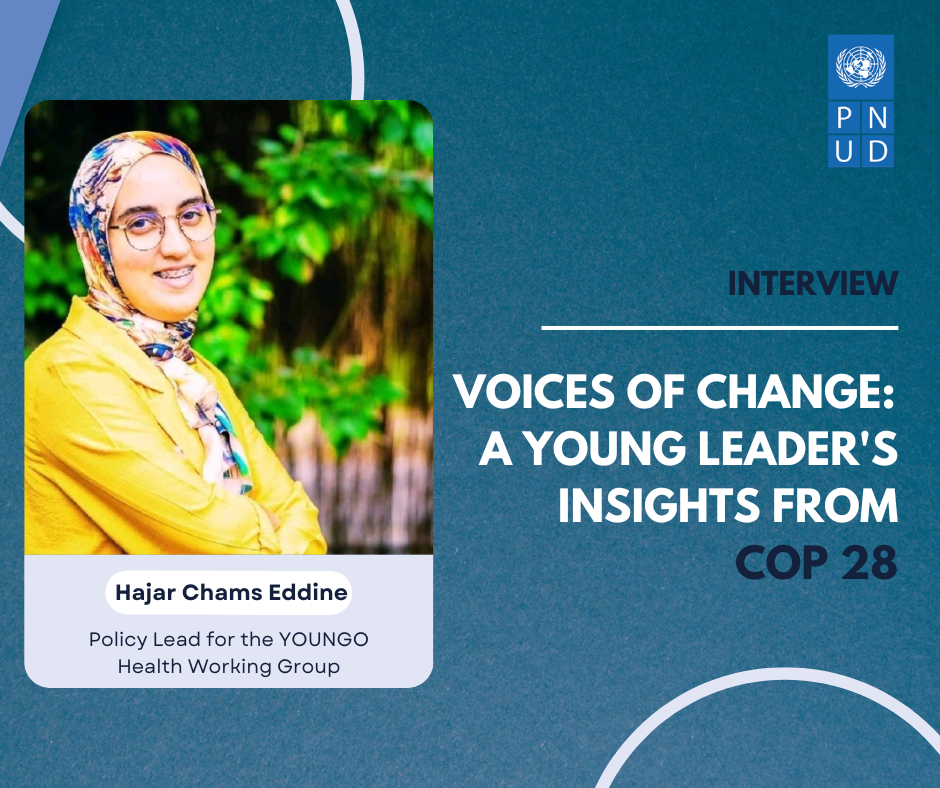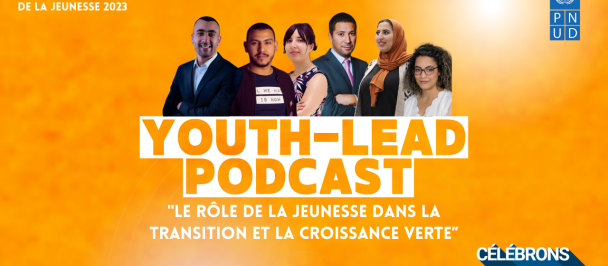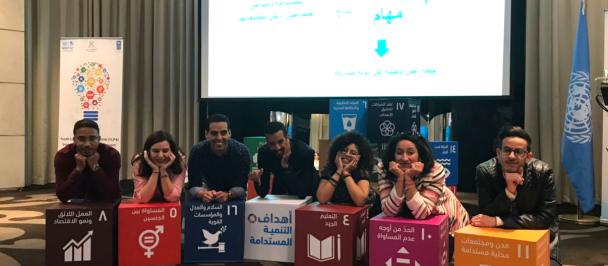Voices of Change: A Young Leader's Insights from COP 28
1 février 2024

In an era where climate change is not just a looming threat but a present reality, the voices and actions of young leaders are increasingly vital in shaping our global response.
Hajar Chams Eddine, Morocco's inspiring young delegate at COP 28, stands at the forefront of this battle. As a Policy Lead for the YOUNGO Health Working Group and a first-year PhD researcher in Epidemiology, focusing on the intersection of Climate Change and Mental Health, Hajar brings a unique perspective to the table.
In this interview, we delve into Hajar’s participation in the recent COP 28 held in Dubai. It aims to shed light on her experiences at the Conference, her insights on the connection between environmental issues and mental health, as well as her vision for empowering young people to shape a sustainable and resilient future.
1/ What motivated you to specialize in epidemiology, particularly focusing on climate change and mental health? How does your academic background in environmental economics influence your approach to climate change issues?
In 2018, I decided to study Environmental Economics, which was the start of a long and ongoing climate journey. I have developed an in-depth understanding of the role that economics plays in determining public policies related to climate and health. For my research, I tackled the impacts of environmental policies on public health through an economic growth model. For this project, I focused on air pollution’s effects on the population’s health. This work deepened my interest in the impacts of climate change on health and became a basis to focus more on public health in research and advocacy.
Recently, I started a PhD in Epidemiology with a particular focus on the impacts of climate change on mental health at the Mohammed VI University for Sciences and Health - Mohammed VI Centre for Research and Innovation in Rabat. Mental health has always been a cause that I believed in and advocated for inside and outside the climate sphere. The stigma around mental health has harmed our society, and now with the climate change threats, we are subject to exacerbation of existing mental health, neurodevelopmental and psychiatric conditions and triggering new emerging ones such as eco-anxiety and eco-depression. Despite the huge impacts of climate change on our mental health, this nexus is disregarded in research, particularly when it comes to the contexts of developing countries. It is an opportunity to dedicate my efforts to mental health research and join the global climate health research momentum.
2/ At COP28, you represented Morocco as a young delegate. What were your main goals and messages at this event? How do you see the role of young leaders like yourself in shaping global climate policies? What innovative ideas did you present or learn about at COP28 regarding climate action?
My main role on the ground this year was to support the efforts of the Children and Youth Constituency of the UNFCCC as a Policy WG member and Health WG member. This is my second participation at COP, and I would judge that this one was more effective. I took part in two health side events, the first was with the London School of Hygiene and Tropical Medicine jointly with YOUNGO Health Working Group on co-designing sustainable and healthy cities for youth with youth. The second was a panel discussion organized by Health Care Without Harm on the role of civil society and healthcare professionals in fighting air pollution. Additionally, I participated in a bilateral with the Spanish Presidency of the European Union, on behalf of YOUNGO and along with other colleagues from the constituency. I presented our health demands contrasting EU commitments on the topic of environment, climate and health in an attempt to highlight the importance of acting urgently on the climate health nexus.
The COP space fosters a representation from all around the world. It is always interesting to learn about the impacts of climate change from frontline and climate-vulnerable communities, and it is a space to have enlightening discussions on climate, colonialism, politics and history with other youth where each one of us had brought their perspectives and knowledge to the space. I truly believe that our role as youth leaders is to learn, research, and listen to others to not remake the same history but to make a change and to be held accountable for our actions. Climate change is an intersectional issue that calls for the implication of everyone. We should call out any gatekeeping and “youth-washing” behaviors and be clear on the importance of actual official implications in the decision-making processes. Young people have been long enough used to fill in diversity quotas and youth advisory groups, but now it is time to have an actual seat in the table.
3/ As a policy lead for the YOUNGO Health Working Group, what are your key strategies for inclusive climate action? Can you discuss any specific projects or initiatives you are involved in that aim to integrate mental health considerations into climate action?
My role as Policy Lead of the Health Working Group was mainly to coordinate the health demands and ensure a transparent representation of youth demands in the Global Youth Statement. Consultations and working sessions have been organized with the youth interested in health to shape the global health demands. Together we called upon parties to address and alleviate global health issues relating to climate change, to consider the serious impacts of climate change on mental health and well-being, and to support robust, climate-resilient healthcare systems that provide everyone with access to high-quality treatment. It was important for me to emphasize the disproportionate effects of climate change affecting vulnerable communities, children, the elderly and people with disabilities in its wider and more inclusive meaning.
To explain, the Global Youth Statement is an official document consolidated by the YOUNGO Policy Team. It is a Climate Justice Declaration that combines the voices of youth from all around the world. It was essential in this process to ensure the inclusion of all voices with participation from over 160 countries and is supported by tens of thousands of signatories, accumulating over 750,000 inputs globally, which took approximately 53 thousand hours of work and was done through the efforts of 1,500 volunteers.
I was glad to see that mental health has gained more interest during this COP with many organized side events discussing the topic from various aspects with a high level of engagement from participants. This year, I am aiming to lead climate mental health on a local level through bridging research to impactful action. There is a serious need for action to build a collaborative ecosystem and mobilize decision-makers and mental healthcare providers in this nexus on a national level.
4/ What challenges have you faced in your journey as a young climate activist and how have you overcome them? Looking forward, what are your aspirations for the future of climate action in Morocco and globally?
Mental health is always a big challenge when speaking up about topics such as climate change, between deniers, politicians, and corporates, youth advocates in the global sphere doubt the effectiveness of their actions in front of a complex political system constrained by global power dynamics. Climate change isn’t only about climate, but it is also about colonialism, peace, human rights, transparency, indigenous people’s rights, and vulnerable communities’ rights. When talking about climate action we cannot be selective on basic rights and this is what the youth community has proven this year, that the climate sphere is not only about climate change but a place to raise the right questions of power dynamics, colonialism and the historical accountability of the global north countries and the fossil fuels countries.
On a national level, the voice of youth in climate action should be amplified to showcase the local grassroots actions and empower youth representation with the official national delegation. I aspire to see a Moroccan young negotiators program implemented by the Moroccan ministries and institutions. It is important to capitalize on existing human capital and youth with the subject matter expertise. Some amazing youth have been fighting for so long either at the local level directly with affected communities or at international conferences and high-level meetings. These youth on the ground are the ones whom we should support.
Globally, I am aspiring for the global climate health community to continue on the important steps that happened this year during COP28, where we had the first Health Day, the first Health Ministerial Meeting with the presence of over 110 Health Ministries and 50 Ministers of Health, in addition to the COP28 UAE Declaration on Climate and Health adopted by over 140 countries. In my personal opinion, the health demands that were presented in our Global Youth Statement elaborated by the Children and Youth Constituency of the UNFCCC were covered to a certain extent in the Declaration and the discussions that happened inside COP28. These are good achievements, yet they are nothing close to what we need. Health should be a priority inside the negotiation rooms. The climate crisis is a health crisis and all Parties should be held accountable for their actions causing climate change and impacting our health and disproportionally the health of the most vulnerable communities, frontline communities and people with disabilities.
********************
Ms. Hajar Chams Eddine is a dynamic Moroccan climate advocate and first-year PhD researcher in Epidemiology at the University Mohammed VI for Sciences and Health, focusing on Climate Change and Mental Health. She holds a Master's in Environmental Economics from Mohammed V University. Hajar is the Policy Lead for the YOUNGO Health Working Group and an active member of the YOUNGO Global Coordination Team-Policy Team. She also serves as a Youth Advisor for the London School of Hygiene and Tropical Medicine's Children, Cities, and Climate Action Lab. Additionally, Hajar is the founder of EnviroGen Consulting, specializing in the climate-health-development nexus in Morocco. Her work is centered on advocating for inclusive climate action, mental health awareness, the rights of people with disabilities, and resilient healthcare systems.
Young people have been long enough used to fill in diversity quotas and youth advisory groups, but now it is time to have an actual seat in the table.

 Locations
Locations


